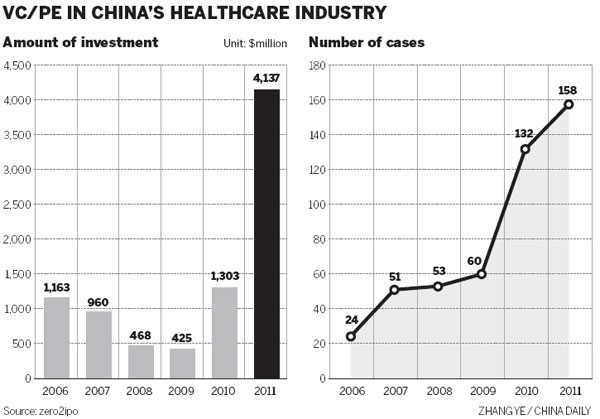As demand for high-quality healthcare rises in China, venture capital and private equity companies are taking advantage of ample investment opportunities in the nation's private and specialized hospitals.
"Investment in private and specialized hospitals offers real opportunities," said Xu Xiaolin, general manager of CCB International Wealth Management (Tianjin) Ltd.

Xu said the company had invested in a high-end children's hospital in southwestern China.
The company has two objectives - to provide basic medical treatment, and offer high-end services, the main source of making profits for the hospital
Cai Daqing, a director at Legend of Capital Co Ltd, said it had invested more than $100 million in 14 medical and healthcare-related companies over the past five years.
At least two of these companies are preparing to go public, Cai added.
Legend Capital's portfolio companies in the sector include a maternity hospital and Evercare Med Institution, a cosmetic surgery hospital.
"Though we realized that there are many difficulties in investing, getting listed and exiting, the prospect of investing in hospitals is bright and some exit channels for VC and PE firms have appeared."
Cai added that, as it was unable to invest in State-run hospitals, Legend Capital chose to focus on private, specialized and high-end hospitals.
There were 158 investment deals in the medical and healthcare sector last year, worth $4.14 billion, around the same amount as the total deals in the sector from 2006 to 2010, according to a report from the Zero2IPO research center.
The report said 28 medical and healthcare companies were listed last year, raising $5.33 billion, and 12 of them were backed with VC or PE investment.
Every Chinese citizen made an average of 4.63 visits to the nation's 959,000 medical institutions last year, according to the report.
The State Council passed a medical reform plan in 2009 that promised to spend 850 billion yuan ($123 billion) by last year to provide universal medical services to the country's 1.3 billion people.
"We treat private medical institutions equally (with public ones), and they can be included in the scope of basic medical insurance under certain conditions," said Li Jinghu, deputy director of the Institute of Social Security at the Ministry of Human Resources and Social Security.
Li said China had almost 17,000 private medical institutions by the end of last year, with community medical institutions growing at the fastest rate - 8.2 percent last year.
